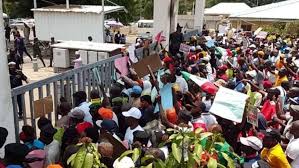
Israel attacks, declaration of war – Iran
Iran referred to Israel's Friday attack wave as a "declaration of war" after the Israeli military killed top nuclear scientists and the head of the armed forces, among other high-ranking officials, and struck around 100 targets, including nuclear facilities.
The Iranian military stated that there were "no limitations" to its response, while Iran's supreme leader, Ayatollah Ali Khamenei, warned Israel that it risked a "bitter and painful" fate as a result of the assaults.
Foreign Minister Abbas Araghchi "called on the Security Council to swiftly address this problem" and referred to Israel's attack as a "declaration of war" in a letter to the UN, according to the ministry.
While neighboring Jordan claimed to have intercepted drones and missiles that had infringed on its airspace, the Israeli military claimed that Iran had fired some 100 drones, which were intercepted by air defenses outside of Israeli territory.
The Israeli assaults, which Israel claimed comprised 200 fighter jets, were known to him beforehand, US President Donald Trump told Fox News. In addition, Trump emphasized that Tehran "cannot have a nuclear bomb."
Although Tehran stated that Washington would be "responsible for consequences," the United States emphasized that it was not involved in the Israeli action and cautioned Iran not to strike its personnel or interests.
Targeting nuclear scientists and the primary underground enrichment facility in Natanz, Prime Minister Benjamin Netanyahu said that Israel had struck at the "heart of Iran's nuclear enrichment program."
The Israeli commander declared that the strikes would "continue as many days as it takes," while the military claimed that intelligence indicated Iran was getting closer to the "point of no return."on its nuclear programme.
According to Iranian media, the attacks claimed the lives of Hossein Salami, the leader of the Revolutionary Guards, and Mohammad Bagheri, the country's top military official and chief of staff for the armed forces.
State media said that a key adviser to the supreme leader had been injured, and Khamenei promptly named new commanders to replace those slain.
The "specific targeting of senior commanders... delivers a strong and unambiguous message: those who work toward Israel's destruction will be destroyed," according to Israeli Defense Minister Israel Katz.
A large hole in the side of a residential building in Tehran was visible in AFP photos, suggesting that the strike was localized and targeted.
According to state media, civilians were murdered, including women and children. Six nuclear scientists were among the fatalities, according to the Tasnim news agency.
Flights are halted.
With the exception of the lines at gas stations, which are common during emergencies, Tehran's streets were empty.
Imam Khomeini International Airport, Tehran's primary entry point, saw a halt in air activity, and aircraft were suspended and their airspace blocked in Iraq and Jordan.
In addition to Iraq, Jordan, Lebanon, and Syria, Gulf Airlines canceled flights to and from Iran.
Hours after Israel closed its airspace and proclaimed a state of emergency, the Jordanian military reported that its planes and air defense systems had intercepted "a number of missiles and drones that penetrated Jordanian airspace."
Iran's military claimed that there are "no limitations in responding to this atrocity" and accused Israel of going beyond "all red lines."
Following Trump's warning of the Israeli strikes, oil prices rose while equities fell.
Following Trump's warning of a "massive conflict" in the region, the Israeli strikes caused stocks to plummet while oil prices rose.
After Iran threatened to attack US military installations in the Middle East if war broke out, Trump also announced that the US was reducing its personnel there.
Trump stated before the strikes that he thought an agreement on Iran's nuclear program was "pretty close," but he issued a warning that an Israeli strike on its bitter enemy may ruin the chances of a deal.
The US president stated, "I do not want them going in, because I think it would blow it," without providing specifics of the talk he had with Netanyahu on Monday.
"It might actually improve it, but it could blow it," Trump added swiftly.
"Within grasp"
Declaring that Washington was not involved, US Secretary of State Marco Rubio cautioned Iran against striking US bases in retaliation for Israeli strikes.
Trump stated that Washington is still "hoping to get back to the bargaining table" despite the violence casting doubt on whether the sixth round of scheduled US-Iranian talks would still take place in Oman on Sunday.
The Israeli military claimed it struck the underground uranium enrichment centrifuges at the expansive site, while the United Nations nuclear watchdog, the International Atomic Energy Agency (IAEA), confirmed Natanz as one of the targets and stated it was "closely watching" the situation.
"Extremist"
Iran is viewed as an existential threat by Israel, which depends on US military and diplomatic assistance.
Netanyahu has pledged less restraint since the unprecedented October 7, 2023, attack on Israel by Tehran-backed Hamas, which triggered the war in Gaza.
Last year, Iran and Israel exchanged direct attacks for the first time following the Hamas attack.
In addition to Hamas, Israel is fighting the Huthis in Yemen and Hezbollah in Lebanon, two Iranian proxies.
Iran has continuously denied the accusations of pursuing a nuclear weapon made by the United States and other Western nations.
Israel once more demanded international action after the IAEA charged Iran on Thursday of breaching its commitments.





